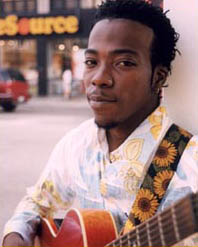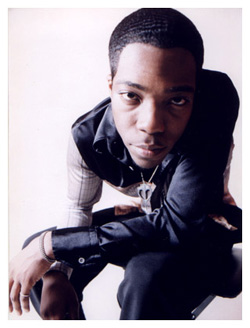PEVEN EVERETT / “Ghetto”
Back when I lived in New Orleans, I would drive through my old neighborhood every once in a while. There was no particular order to it, no discernable pattern, no rhyme or reason. I didn’t pick certain days, or streets, or weather. I don’t know why I did it. It’s just that every so often, I would feel like something was missing. On those days, I’d put some fresh CDs in the changer and go driving.
Driving through my ghetto one more time…
All I got is my radio to keep me company in my time of need
Inevitably, I’d end up cruising through the Lower Ninth Ward. Sometimes, if I had enough time and the feeling was there, I’d go up and down the side streets and the back ways, checking out some of the streets I used to play on as a kid. I would drive past the rows of little, beat-up houses, trying to remember which friend used to live in which house. I couldn’t drive past any of the places my friends and I used to hang out at. They’re all gone, like my friends. Ms. Lillian’s Sweet Shop. Ms. Ross’ restaurant. Ace Package Liquor store. The first two are vacant lots. The last is an empty shell.
I know sometimes things can go wrong
I see my sick brothers in the sunlight

If Peven Everett’s “Ghetto” is biographical—and I bet it is—Peven wrote the song as a soundtrack to accompany the feeling we get that sends us back to the places we came from, even when those places aren’t the kinds of places anyone would really want to go back to.
I’m glad I’m free, but I’m sad when
I’m driving through my ghetto
Sometimes, I couldn’t bring myself to turn onto any of the crowded, broken side streets. Those days, I’d stick to Claiborne or St. Claude Avenue, the main thoroughfares. I’d drive straight through the Lower Nine, into St. Bernard Parish, then back out across the Chalmette Bridge, heading home to my apartment in New Orleans East. When I was driving, I always listened to music. Usually, it was classic soul: War, Stevie, Marvin, Mayfield. Sometimes it would be something newer, maybe 4Hero, Zero 7, Julie Dexter or Suba. No matter what the singer was singing about, my thoughts were usually with the children.
I’m glad I made it out of this, no doubt
But I’m still a ghetto child
I grew up in the Lower Nine in the early and mid-Eighties. Crack wasn’t yet king. AIDS was mostly a rumor. ‘Reform’ programs like Welfare To Work and No Child Left Behind were years away. Things were hard, but for most of us, not actually dangerous. (The danger was there, but it came later.) For the ghetto children growing up now though, in the 21st century…. Let’s just say I wouldn’t wish the 21st century ghetto on my worst enemy.
The children play in the sun / They don’t care about anyone
Things on their mind, but not the serious things
I don’t know all of the answers. I’m not even convinced that I know all of the questions. I do know that there are those who have far more than they need and I know there are those who have far less. Then there are those of us who grew up with less and now have more. Whether we attribute our good fortune to luck, quality parenting, or to the grace of a good God, we should all be thankful.
It’s not just a story / It’s my life….
We know in our hearts that we owe it to the ghetto children of today to do more than live our own individual lives. Whatever we received, whatever it was that pushed us towards a positive path, it wasn’t a gift. It was loan. And it can’t be paid back. Like the movie, it can only be paid forward. So if you’re a ghetto child—or even if you aren’t—listen to Peven’s song and ask yourself: are you doing something to give back? Or are you just driving through?
* * *

“Ghetto” is from Peven’s 2004 CD, Latest Craze, which should be easy to find. The bonus track, “Colored Culture,” is a bit of a throwaway track, but a beautiful one. The electronic groove is dense and busy, somewhat reminiscent of Miles’ later experiments. But the main melody is what I like. It’s very loose, very open, giving the listener the feeling of freedom, flying or floating. It’s also great music to drive by. “Colored Culture” is taken from Peven’s self-released 2003 EP My Brazil. The best place to find that one (or any of Peven’s many other self-released CDs) is at http://www.dustygroove.com.
—Mtume ya Salaam
Now you see
Yesterday (11 Nov. 2005) I went home for the first time since the storm. Drove out to the East, down Gentilly to Crowder, Crowder to I-10, got off I-10 at Morrison, down Morrison to Crowder again, out Crowder to the lake, turned down to Read, Read to I-10 and drove up and out. I believe if I had stopped and stepped out on the sideway, I would have cried.
It wasn’t just block after block, it was mile after mile of utter destruction. There is nothing television shows you that really gives you the full extent of the destruction.
I know precisely why Mtume likes these tracks, or I should say, I think I know: because they describe a state of mind sometimes called the survivor’s syndrome—the feeling of guilt, or angst, or just plain sadness that the survivor gets when the survivor surveys the destruction that one has survived, or something like that. I’d have to think about it a bit more to adequately describe it.
So in this case it’s not so much about the music as it is the association this music has for Mtume. I might not choose the same soundtrack, but I would be feeling the same feelings.
Peven’s lyrics are on point. I’m not crazy about the overall sound, probably because I grew up on jazz as my instrumental music of choice: Pops, Duke, Trane, and hundreds of others, most people have never heard. I realize that the majority of what people call (smooth) jazz today is just pop music without lyrics. The complexities of deep jazz and the complexities of the thoughts behind the music are mainly missing from the radio. What we get instead is pre-cooked aural pablum, as if we were babies with no teeth or adolescents with severe hormonal imbalances.
All of which is to say, after reading Mtume’s description, I didn’t need to hear the music. I could supply my own soundtrack—something achingly sad, perhaps some Trane
—Kalamu ya Salaam
This entry was posted on Sunday, November 13th, 2005 at 4:48 am and is filed under Contemporary. You can follow any responses to this entry through the RSS 2.0 feed. You can leave a response, or trackback from your own site.
3 Responses to “PEVEN EVERETT / “Ghetto””
November 13th, 2005 at 10:54 am
Mtume, this piece is on point! I love the way you interjected your personal observations with the lyrical content. I have to disagree with Kalamu though…the music seems to be the perfect background soundtrack to the message that he is sending.
December 14th, 2005 at 12:17 pm
Pevin your music is definitely contagious, nice beats topped with sweet and hypnotic vocals.
Leave a Reply
| top |